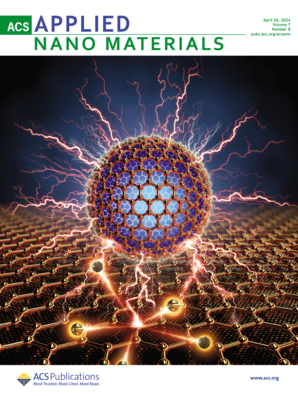Room-Temperature Synthesis of Au@AuCu Alloyed Nanorods in Aqueous Solutions for High Catalytic Activity and Enhanced Stability
IF 5.3
2区 材料科学
Q2 MATERIALS SCIENCE, MULTIDISCIPLINARY
引用次数: 0
Abstract
Cu-based nanocrystals are desirable for high efficiency catalysis, although they are easily oxidized under ambient conditions. Alloying Au and Cu provides the strategy for Cu-contained nanocrystals toward both high stability and high catalytic activity. However, a synthetic method of homogeneous alloy nanocrystals with tunable composition in aqueous solutions is lacking. Specific composition for achieving both enhanced stability and high catalytic activity remains elusive. Herein, coreduction of Au3+ and Cu2+ was performed through controlling the kinetics of the coreduction to form AuCu alloyed shells on the Au nanorod (NR) cores and obtain Au@AuCu NRs under the protection of nitrogen. The Cu atomic fraction (atom %) of the shell was finely tuned from 0 to 100% by controlling the fraction of Cu2+ cations in the growth solution. For Au@Au0.85Cu0.15 NRs, epitaxial growth of AuCu alloy on the Au NR was evidenced with about 4.0% lattice mismatch due to Cu alloying in the Au lattice by high-resolution transmission electron microscopy. Au@AuCu NRs with different aspect ratios were also obtained for tuning longitudinal plasmonic resonance. Stability characterization indicates that the Au@AuCu NRs with Cu atom % in the shell lower than 15% are of enhanced stability, while an increase in Cu atom % in the shell from 0 to 15.3 and 100% leads to dramatic reduction of the activation energy, Ea, of p-nitroaniline from 111 to 45 and 33 kJ/mol, respectively. Therefore, Au@Au0.85Cu0.15 NRs are preferable for high catalytic activity and enhanced stability.

在水溶液中室温合成 Au@AuCu 合金纳米棒,提高催化活性和稳定性
铜基纳米晶体是高效催化的理想材料,但在环境条件下很容易被氧化。金和铜的合金化为含铜纳米晶体的高稳定性和高催化活性提供了策略。然而,目前还缺乏在水溶液中合成成分可调的均相合金纳米晶体的方法。同时获得更高的稳定性和催化活性的特定成分仍未确定。在此,通过控制核诱导的动力学,在金纳米棒(NR)核上形成 AuCu 合金壳,并在氮气保护下获得 Au@AuCu NR。通过控制生长溶液中 Cu2+ 阳离子的比例,外壳的铜原子分数(原子%)可从 0 微调至 100%。对于 Au@Au0.85Cu0.15 NRs,通过高分辨率透射电子显微镜观察,证明了 Au NR 上 AuCu 合金的外延生长,由于 Au 晶格中的 Cu 合金化,导致约 4.0% 的晶格失配。此外,还获得了不同长宽比的 Au@AuCu NR,用于调节纵向等离子体共振。稳定性表征结果表明,铜原子在外壳中所占比例低于 15%的 Au@AuCu NRs 具有更高的稳定性,而铜原子在外壳中所占比例从 0 增加到 15.3 和 100%时,对硝基苯胺的活化能 Ea 分别从 111 显著降低到 45 和 33 kJ/mol。因此,Au@Au0.85Cu0.15 NRs 可提高催化活性和稳定性。
本文章由计算机程序翻译,如有差异,请以英文原文为准。
求助全文
约1分钟内获得全文
求助全文
来源期刊

ACS Applied Nano Materials
Multiple-
CiteScore
8.30
自引率
3.40%
发文量
1601
期刊介绍:
ACS Applied Nano Materials is an interdisciplinary journal publishing original research covering all aspects of engineering, chemistry, physics and biology relevant to applications of nanomaterials. The journal is devoted to reports of new and original experimental and theoretical research of an applied nature that integrate knowledge in the areas of materials, engineering, physics, bioscience, and chemistry into important applications of nanomaterials.
 求助内容:
求助内容: 应助结果提醒方式:
应助结果提醒方式:


